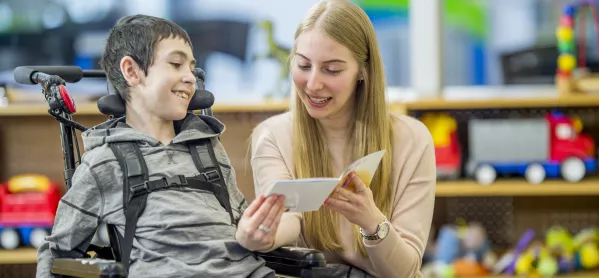- Home
- Teaching & Learning
- Specialist Sector
- How to succeed as an NQT in a special school
How to succeed as an NQT in a special school

When it comes to the NQT year, it’s accepted that it is a very busy and stressful time for pretty much every new teacher. But my NQT experience was a bit different from most.
After I graduated, I specialised in special educational needs as soon as I could. I came across Chailey Heritage School - a school for children with complex physical and medical needs - and felt it was the right place for me. Although it had never assisted a teacher through their NQT year before, it was keen to help me through this.
Special schools: Tips for NQTs
Here are the things that enabled me to succeed, and that I would recommend to others in a similar position:
Know the curriculum
More and more special schools are opting to move away from the national curriculum. The curriculum knowledge that I brought into my new job from university was therefore almost completely redundant. At Chailey, we follow the Chailey Heritage Individual Learner Driven (CHILD) Curriculum (you can learn more about this in a recent article by our headteacher Simon Yates here).
Getting to grips with a whole new curriculum was a steep learning curve. My advice for anyone starting in a school that follows a specialist curriculum would be to explore the school’s website. Read the resources on offer, whether that’s information for prospective/current parents, the assessment strategies used or examples of school documents. It will be impossible to know everything, but the fewer surprises, the better.
Seek out colleagues
Despite the large teams of teaching assistants working in such a special provision, I often experienced feelings of loneliness. For children with such individual needs, the idea of joint working between colleagues, as you would see in a primary school, would certainly not be best practice. Lone working and planning are usually required.
The standard NQT support programme will not always be relevant to your development. I did not attend any conferences in my NQT year, but I was conscious that I did not want to continue to isolate myself from others. Instead, I tried to actively engage with the variety of different professionals that you find in special schools like Chailey. This really helped me develop my knowledge in several areas of my pupils’ education.
I spoke to doctors and nurses about the medication my pupils were prescribed, their side effects and how this could affect my day plans; to therapists about new and exciting strategies for communication or physical development; and to specialist teachers about progressing pupils’ functional vision.
One exciting thing about having to make these contacts and expand your working group is that you never know what project may take your interest next. For me it led me to Kidenza Orchestral Concerts where I have recently become a trustee. Kidenza organise and provide outstanding, fun, and educational classical concerts for mainstream and special schools and I am delighted to be part of this new charity.
Always listen to advice
The young people at Chailey always need at least one-to-one support - and sometimes two adults - to be safe. For some of our young people, the constant assistance of a suitably qualified nurse is required.
As you can imagine, this pushes the numbers of teaching assistants (TAs) in the class up massively and, more often than not, the numbers of support staff will exceed the numbers of pupils in the classroom. Managing these large teams of TAs is an important aspect of becoming a successful teacher in a special provision.
I found that honesty (regarding my inexperience) certainly was the best policy. Being a good listener and open to the advice that these often very experienced TAs can provide was not only helpful but showed my willingness to learn and become the best teacher I could be.
Oliver Dixon is a teacher at Chailey Heritage School in East Sussex
You need a Tes subscription to read this article
Subscribe now to read this article and get other subscriber-only content:
- Unlimited access to all Tes magazine content
- Exclusive subscriber-only stories
- Award-winning email newsletters
Already a subscriber? Log in
You need a subscription to read this article
Subscribe now to read this article and get other subscriber-only content, including:
- Unlimited access to all Tes magazine content
- Exclusive subscriber-only stories
- Award-winning email newsletters
topics in this article



